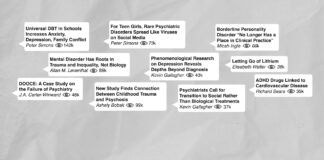Tag: inequality and mental health
Mad in America’s 10 Most Popular Articles in 2023
A roundup of Mad in America's most read blogs and personal stories of 2023 as chosen by our readers.
Study Finds Greening Urban Land Improves Mental Health
Remediating dilapidated physical environments in urban settings can contribute to better mental health.
Anti-Stigma Campaigns Enable Inequality, Sociologists Argue
Scholars contend that stigma functions as a mechanism of power in analysis of UK Heads Together mental health campaign.
Protecting the LGBT Community is Good Health Policy
From The Hill: Research shows that LGBT individuals experience higher rates of physical and mental health problems than heterosexual people. Legislative policies that protect the rights of...
Why Society Drives You Mad
In this video for IAI TV, clinical psychologist and vocal critic of psychiatry Richard Bentall reveals why structural inequality, institutional racism, and systemic oppression play...
Inequality is Bad For Your Health
From Pacific Standard: In a recent study featuring a group of American twins, twins who experienced greater levels of inequality showed more physiological signs of...
Food Insecurity Linked to Mental Health Globally
Global analysis of 149 countries finds food insecurity is associated with poorer mental health.
Are DNA Changes the Link Between Poverty and Mental Illness?
Researchers at Duke University who studied 183 adolescents for three years found that increased depression associated with poverty may be mediated by epigenetic changes in DNA. The...
Comments on Jeffrey Lieberman and Ogi Ogas’ Wall Street Journal Article...
The March 3rd, 2016 edition of the Wall Street Journal featured an article by past President of the American Psychiatric Association (APA) Jeffrey Lieberman and his colleague, computational neuroscientist Ogi Ogas. The article was entitled “Genetics and Mental Illness—Let’s Not Get Carried Away.” In their piece, the authors started by expressing the belief that a recent study identified a gene that causes schizophrenia, and then discussed whether it is desirable or possible to remove allegedly pathological genes in the interest of creating a future “mentally perfect society.” The authors of the article, like many previous textbook authors, seem unfamiliar with the questionable “evidence” put forward by psychiatry as proof that its disorders are “highly heritable” In fact, DSM-5 Task Force Chair David Kupfer admitted that “we’re still waiting” for the discovery of “biological and genetic markers” for psychiatric disorders.
“Social Factors Influence Schizophrenia?”
PsychCentral covers new research linking social deprivation, population density and inequality with higher rates of psychotic symptoms and diagnoses for schizophrenia. “This is important because other research has shown that many health and social outcomes also tend to be optimal when societies are more equal.”
Child Poverty Linked to Early Neurological Impairment
A new NIH-funded study suggests that children from low-income environments are more likely to have neurological impairments. The researchers claim that these neurodevelopmental issues are “distinct from the risk of cognitive and emotional delays known to accompany early-life poverty.”
“U.S. Doctors Advised to Screen Child Patients for Signs of Hunger”
The American Academy of Pediatrics came out with new recommendations that suggest doctors screen all of their child patients for hunger. About 16 million children in the US live in food scarcity and poverty that can lead to physical health issues as well as behavioral issues, which can then be misdiagnosed.
Relieving Poverty Significantly Improves Mental Health
Giving money to people diagnosed with severe mental health issues can significantly improve depression and anxiety. A new study, published in the October issue of the Journal of Community Mental Health, found that giving about $73 US dollars per month for recreational spending can also reduce social isolation and strengthen a sense of self.
















